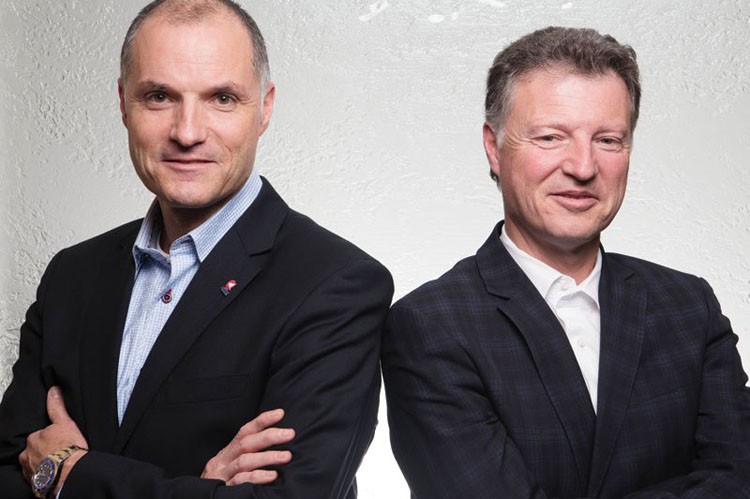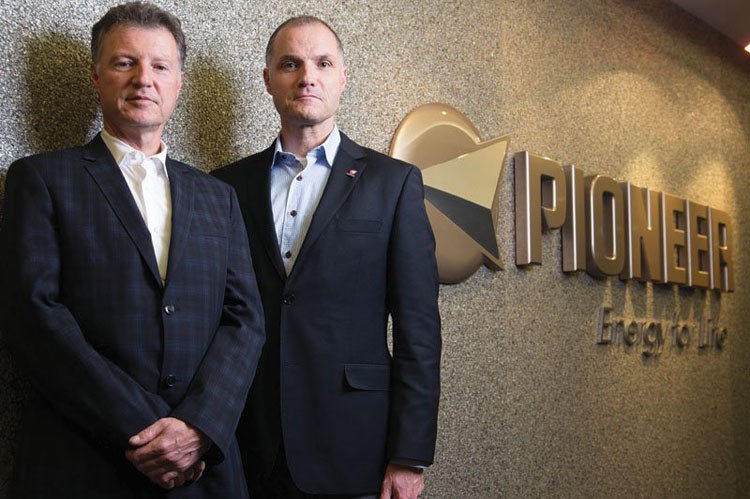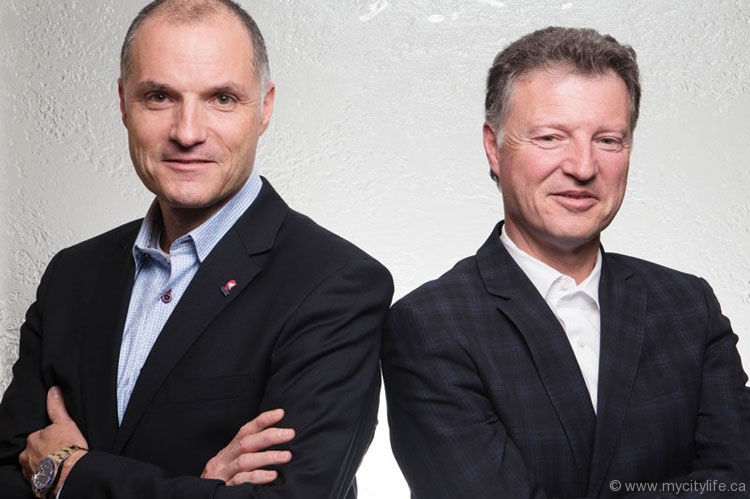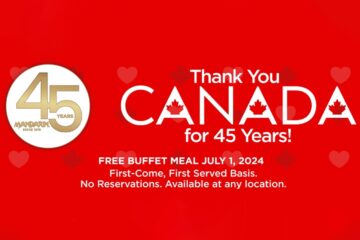Tim and Greg Hogarth – Walk the Talk
What does it take to be a good leader? Two brothers and captains of industry break down how they’ve excelled in their fields and their plan to share this knowledge with business leaders and aspiring entrepreneurs
Tim and Greg Hogarth understand that a strong mentor can be an aspiring leader’s greatest ally. In an ever-changing world where competition is fierce, information spreads instantaneously and businesses, institutions and individuals are constantly under the microscope, the knowledge and experience of an industry veteran can be the difference between success and failure. They’ve wielded this ideal while effectively refining and expanding their own enterprises, and it’s one they wish to share with other entrepreneurs and aspiring leaders, especially those who served in the Canadian Forces.
In the Pioneer Energy LP head office, brothers Tim and Greg recount the journeys to their respective leadership positions. Greg, with more entrepreneurial leanings, started QSR Group Inc. in January 1987. At the time, he had recently left running his own contracting company to manage a portfolio of property leases in the family business. He felt a number of the sites would be a great fit for new Tim Hortons locations, but the donut-and-coffee chain didn’t show the same enthusiasm. He eventually talked them into opening one franchise on one of the sites. Two months before the scheduled opening date, however, he was told no one had been found to run the restaurant. Greg decided to take that on. “My wife and I sold our house so we could get the down payment for the franchise, did the training, opened the restaurant and just worked like heck,” he says. “It turned out to be one of the better restaurants in the chain.” From there Greg used the cash flow to grow the business, opening other Tim Hortons and Wendy’s locations. Today, QSR runs over 25 restaurants throughout Ontario.
Tim took a different path. An alumnus of both Harvard Business School and Bishop’s University, Tim worked his way up the ranks of Pioneer, a company his father, Murray, founded when he opened his first gas station in Hamilton in 1956. The Pioneer patriarch was a staunch proponent of customer service and understood that the lifeblood of any business is the people you employ; he operated with discipline and an ardent resistance to stifling bureaucratic systems. “[Pioneer’s] roots are very entrepreneurial,” Tim explains. “The challenge that we have in our business is to continue to ensure that we maintain that spirit of entrepreneurialism in what we do without becoming too bureaucratized in our processes, systems and structure.” Tim took over as president and CEO of Pioneer in 1998, and since then has grown the company by 500 per cent. He quarterbacked the implementation of Pioneer’s Snack Express service and was instrumental in the acquisition of Esso stations in Manitoba and parts of Ontario, and of Imperial Oil’s home heating business in New Brunswick and Nova Scotia last spring.
Today Pioneer is the largest independent gas retailer in Ontario. Between the 180 retail locations, 225 dealer locations and an expanding reseller business — which supplies various industries, including the Canadian Pacific Railway, and construction and mining companies with commercial fuel — Tim helmed Pioneer to 2.2 billion litres in size. The plan is to take that business to over 3 billion litres and to grow from $2.5 billion in revenue to $3.5 billion within the next four to five years.“You have to have a blueprint for success for your business and for what you want to accomplish,” Tim explains of his leadership strategy. Discipline is needed to focus on where the business should go, how to get there and what objectives need to be met along the way. This plan should be reviewed on at least an annual basis to evaluate its status so corrections can be made to keep it on course. “And that’s the only way, frankly, that we’ve been able to grow this company the way we have over the last 15 years.”
While this pair has made impressive strides in their fields, they understand it’s a feat they didn’t accomplish alone. “My father has always said that when a company is getting started it needs the support of the community to be successful,” explains Greg. “Once that company is successful it has a duty and an obligation to give back to those communities that helped it become [successful].” This philanthropic mindset has seen Pioneer become a supporter of numerous causes, including the McMaster Children’s Hospital (to which the Hogarth family donated $1 million), Canada Company and the Yellow Ribbon Campaign.
But it’s not just financially that these brothers want to give back. Tim is also one of the board members of the Prince’s Operation Entrepreneur (POE) and desires to share his expertise with aspiring business leaders, especially veterans of the Canadian Forces. POE is a national program that helps members of the Canadian military transition into the business world. It connects these soldiers-turned-entrepreneurs with education, financing and mentorship to help get their projects off the ground. Through this program, Tim and Greg hope to provide aspiring leaders with the guidance to excel in both business and life. Entrepreneurs, after all, need mentors and role models. They need industry veterans to keep them grounded and from overestimating their success, to evaluate and suggest adjustments to the organizational structure and to help them avoid basic mistakes. “I think making sure that they are surrounded by advisors, mentors and role models can give them that support that is absolutely critical to achieving success,” says Tim, a former chairman of the Toronto chapter of the Young Presidents’ Organization (YPO). “Many [Canadian Forces veterans] and their families have given a lot in order for us to enjoy the lifestyle that we have today,” Greg, also a former chairman of the Ontario chapter of YPO, adds. “I can’t think of a group of people who deserve our support and respect more than the many people in our armed forces.”
Given some recent political events, guiding principles for leadership are certainly welcomed. Between the Senate expenses scandal at the federal level and the “Crackgate” circus at Toronto City Hall, leadership is a source of lament for plenty of Canadians. According to Jim Fisher, professor emeritus and former vice dean at the Rotman School of Business, leaders today face more scrutiny than ever. It may be a generalization, he says, but “leadership has never been so difficult and never been so necessary.” Fisher explains how expectations of leaders today are almost unattainably high. Despite, for example, any positive strides Rob Ford may have made in office, it’s his seedy private life that has brought him the most scorn. In the past, the personal life of political figures was rarely reported. JFK, for instance, was a noted womanizer, yet it never sparked outrage. The public was more concerned with leaders’ professional track records, with how they commanded and their clear articulation about what needed to be done.
As the second half of the 20th century progressed, however, people questioned what they were told and refused to obey unless convinced it was the right thing to do. We saw a generation burning draft cards and participating in freedom walks, “any of these kinds of things where we said, ‘No, we’re not going to do as we’re told,’” Fisher says. Today, he explains, people are even more sceptical. Leaders must have not only direction and valid reasons why others should follow, but also strong values. “We look for someone who can express a set of values that we really buy into,” he says. Leaders today need a combination of charisma, the ability to get the job done and moral strength — “all three elements have to come together.” With these high standards, it’s easy to see why the public becomes so frustrated with poor leadership. We want leaders who are better than ourselves, and when their flaws are revealed, frustrations arise.
This past November, the POE held its Founder’s Circle event at the Canadian Forces College in Toronto, where entrepreneurs were given the opportunity to hear from prominent leaders from the military and the business world. General Rick Hillier, former Chief of the Defence Staff for the Canadian Forces, was the keynote speaker. Hillier, who is known for his clear leadership principles, echoes the need for stronger values. For Hillier, “service before self is a fundamental characteristic of great leaders.” Leadership is personal, he says. Good leaders need to inspire and motivate. They must lead by example and hold true to their values. “Operate from a solid base of principles and make sure that the vision you’ve articulated, [the] words that you use time after time after time and your actions all marry up and showcase those values, those ethics, every single minute of every single day. You do that and you’re going to have a good chance at success,” says Hillier, author of Leadership: 50 Points of Wisdom for Today’s Leaders.
Hillier believes a three-legged approach is needed to better train leaders in our country. First, leaders need to be educated — but there’s a difference between education and a degree, he notes. “The two are not necessarily synonymous.” Secondly, leaders require professional training; they need to be skilled in their field and capable at executing the job. Thirdly, leaders need practical experience to hone their education and training. These three legs — education, training and experience — need to be sealed by mentorship to give leaders the proper direction during their tutelage.
Mentorship is a key component in Tim and Greg’s approach, as well. At the same POE event these brothers represented the private sector and shared the lessons learned from the highs and lows of their careers. On top of the crucial component of strategic planning, leaders, they say, must create their own success. It’s not going to magically fall in your lap, says Tim, an honorary colonel of the Royal Hamilton Light Infantry. Good fortune and good timing will always play a role, but the key ingredient is your work ethic. “It’s amazing how lucky you can get the harder you work,” says Greg. Also, be entrepreneurial in your day-to-day work. Even in large, structured organizations there is room to think progressively and uncover new, innovative approaches for executing tasks. Tim suggests creating “a burning platform of change” to help spur progress. Such encouragement can bring paradigm shifts that keep organizations relevant and growing. “There are no barriers,” Greg adds. All obstacles are solvable; whether you go through, over, around or under, there is a solution. And don’t wait for responsibility to be given. “Take it and run with it,” says Tim.
“If you wait for responsibility to be given to you, then it may never happen.” And don’t be afraid of failure — it holds valuable lessons. Failure helps people grow and better equips them for the future. “I always looked at my failures as being the tuition that I paid in order to prepare me better for the next experience, the next tough decision, the next tough challenge that I’m going to have to face,” Tim says. “You learn from that and you become a better person, and hopefully a better leader as a result.” Motivating your workforce is also important. Greg explains what is often most effective is not demotivating people. Keep them moving forward and don’t stifle momentum. “Praise in public and criticize in private,” he says. As a leader, it’s also OK to have fun and not take yourself too seriously. Your employees are dedicating the largest portion of their time to your business. If they loathe trekking to the office each day, they’re not going to perform as effectively. Keep the mood positive; show you can relax, “because that’s infectious.”
What it also comes down to, they agree, is being a good role model for your staff. Leading by example is absolutely critical. That means possessing and being true to a clear set of values others can buy into. A good leader, after all, walks the talk. “Employees have to know that you mean what you say and say what you mean,” says Tim. In a business culture, that’s setting the proper example for employees, sharing the spirit of your brand so employees can embrace it and exuding the enthusiasm and passion you have for your business. It’s with this advice that these brothers hope servicemen and -women will excel in the civilian world after sacrificing so much for their country. As Tim concludes, “As business leaders, this is really our simple way of being able to say thank you.”



















































































No Comment